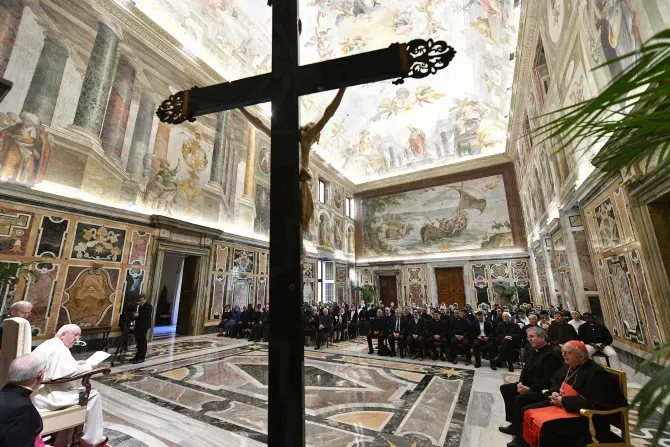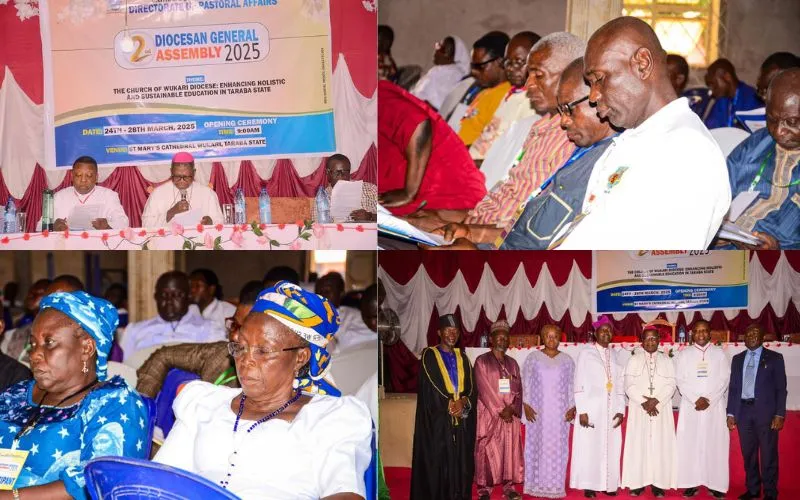 Pope Francis with representatives of the Claretianum Institute of the Theology of the Consecrated Life at the Vatican, Nov. 7, 2022. Vatican Media
Pope Francis with representatives of the Claretianum Institute of the Theology of the Consecrated Life at the Vatican, Nov. 7, 2022. Vatican Media
The pope, departing from the manuscript, according to Vatican News, praised the Claretians for having “humanized so, so much of consecrated life” and for their desire to implement what their founder “valued so much.”
The Claretians were founded in 1849 by St. Anthony Claret. The congregation’s official title is Missionaries of the Immaculate Heart of the Blessed Virgin Mary. Members are active as missionaries around the world.
The Claretianum, founded in 1971, is incorporated into the Pontifical Lateran University as an institute specializing in the theology of consecrated life.
Pope Francis said religious life would find hope through the Word of God and the history and creativity of its founders.
“Religious life is understood only by what the Spirit does in each of the people called. There are those who focus too much on the external — the structures, the activities — and lose sight of the superabundance of grace in people and communities.”
 Pope Francis addressing members of the Claretianum Institute of the Theology of the Consecrated Life at the Vatican, Nov. 7, 2022. Vatican Media
Pope Francis addressing members of the Claretianum Institute of the Theology of the Consecrated Life at the Vatican, Nov. 7, 2022. Vatican Media
While knowing the missionaries were “already facing several challenges peculiar to our time,” the pope encouraged the missionaries to embrace the “value of fidelity in following Jesus according to the spirit of the founders, to carefully care for community life, to live interculturality as a path of fraternity and mission, and to promote the encounter between different generations in consecrated life, in the Church and in society.”
“Do not tire of going to the frontiers, even to the frontiers of thought; of opening paths, of accompanying, rooted in the Lord to be bold in mission,” Pope Francis said.
“The Gospel teaches that there is a poverty that humbles and kills and another poverty, that of Jesus, which liberates and makes happy. As consecrated people, you have received the immense gift of participating in Jesus’ poverty. Do not forget, either in your lives or in your work at the university, those who live the other poverty.”
AC Wimmer is the News Editor for Europe and Asia at EWTN News. The multilingual Australian, raised in Bavaria and South Africa, served as editor-in-chief of several news media outlets. A graduate in Philosophy and Chinese Studies from the University of Melbourne, the veteran journalist is a former Honorary Research Fellow in Communications at his alma mater and served on the Board of Caritas in Munich.




 Pope Francis with representatives of the Claretianum Institute of the Theology of the Consecrated Life at the Vatican, Nov. 7, 2022. Vatican Media
Pope Francis with representatives of the Claretianum Institute of the Theology of the Consecrated Life at the Vatican, Nov. 7, 2022. Vatican Media Pope Francis addressing members of the Claretianum Institute of the Theology of the Consecrated Life at the Vatican, Nov. 7, 2022. Vatican Media
Pope Francis addressing members of the Claretianum Institute of the Theology of the Consecrated Life at the Vatican, Nov. 7, 2022. Vatican Media



